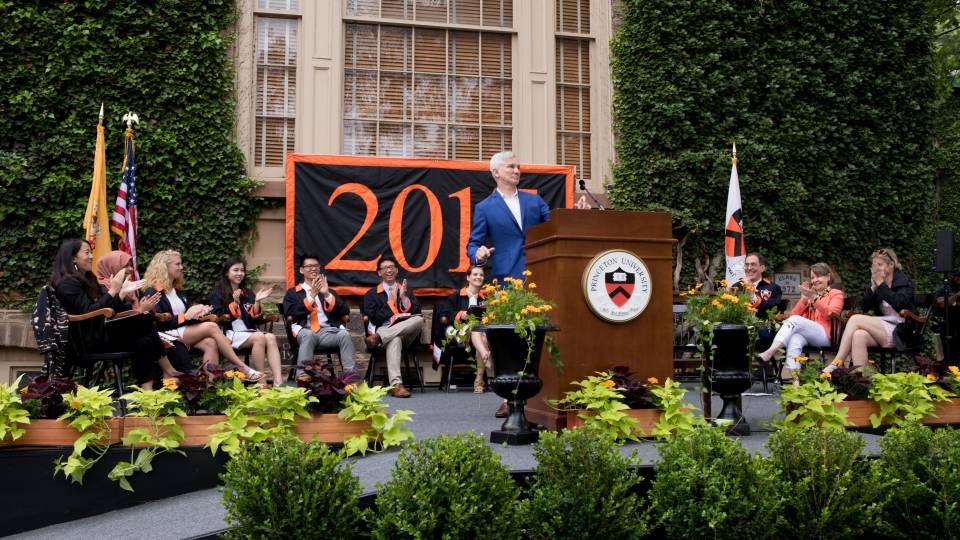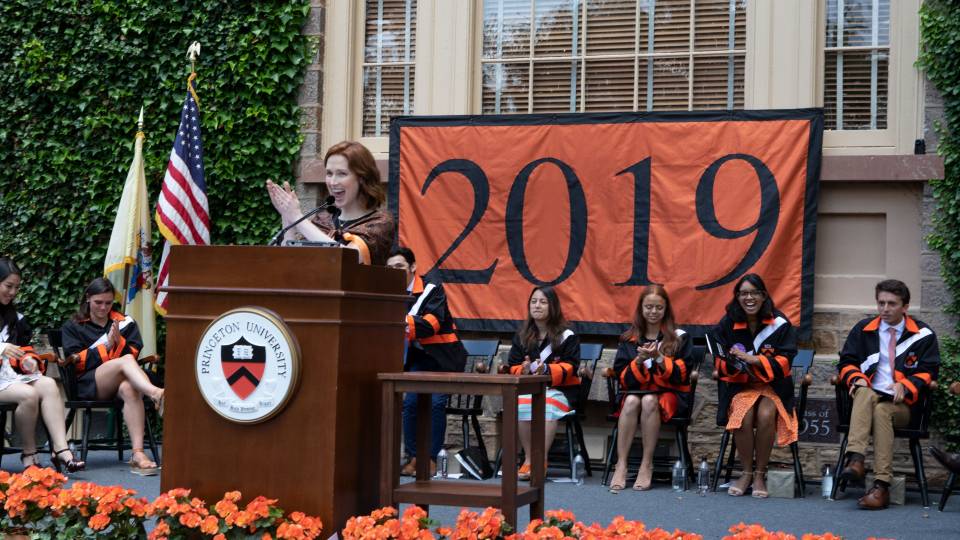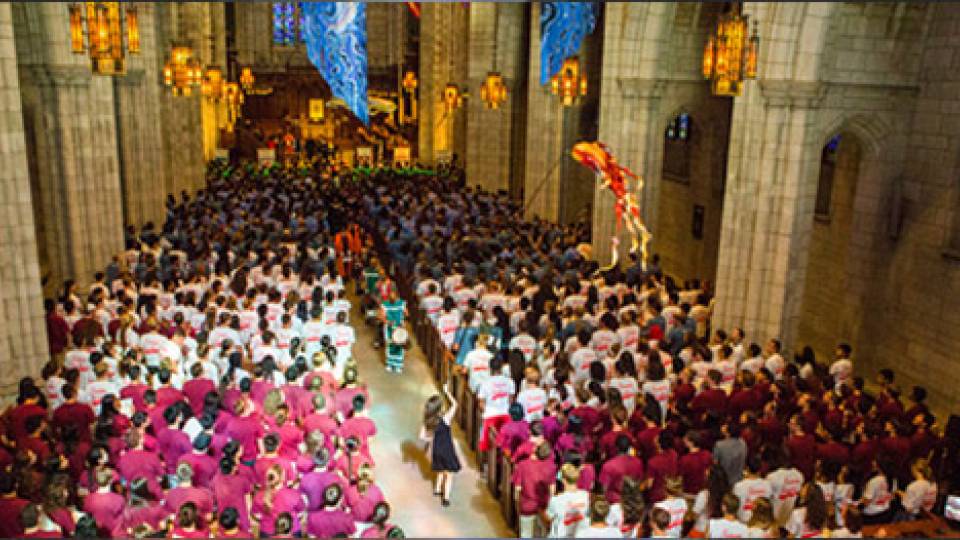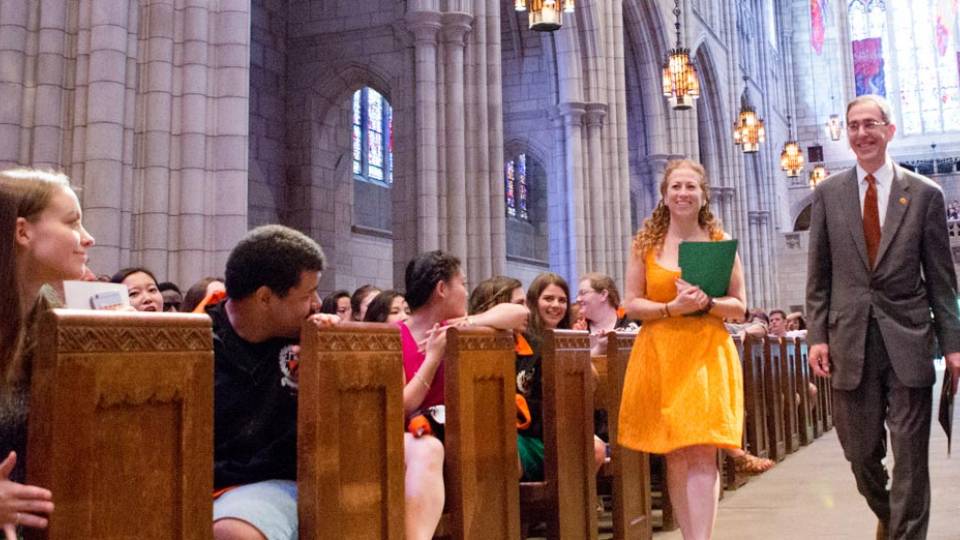They were told that they are the brightest collection of young minds in the world today. They were told that they are the newest members of a strong tradition, and with tradition comes responsibility. They were told that they are the great class of 2005.
Loud applause and cheers filled Richardson Auditorium on Princeton's main campus Saturday night each time a speaker mentioned the wonder of the incoming class. It was the first time the entire freshmen class, a whopping 1,185, was united. And they loved it. Even more, they loved the man they hold most responsible for making their dreams come true -- Dean of Admission Fred Hargadon.
"We love you Dean Fred," a spontaneous duet interrupted from the audience as he began to address the class. "If I were to start college all over again, I'd be very lucky to be your classmate," Hargadon responded and launched a talk peppered with wisdom and humor.
"The world learns of you as numbers," he said. "You are really 1,185 short stories, 20 more short stories than we were supposed to have." (The yield rate for this class was so high that it was impossible to admit anyone from the wait list.)
"Now I don't want to scare you," Hargadon continued. "But I've told my colleagues that we should expect great things of you."
Hargadon told the students he understands their anxiety, that many of them may compare themselves to their classmates and wonder how they themselves gained admission. "Soon you'll gain your confidence and wonder how some of the others got in -- as will I," he said to laughter. He cautioned that the University will be rigorous, that each student has to make many choices and that, "Lots of us will extend a hand but none of us will hold your hand."
The three things freshmen "invariably" report to Hargadon, when he asks how they are doing after a few months on campus, are that: classes cover more ground and move faster than expected, the work is a lot harder than anticipated and "they love it."
Challenging the class to take full advantage of "life's great sabbatical," he closed his remarks by offering advice on how to succeed at Princeton. "Remember, you don't get to do a first draft of college. You only get to do it once so do it well." As well as urging the class to share their "good fortune" with others and try things they have never tried before, Hargadon emphasized five key points.
"Don't be intimidated," he said, retelling the story of a student who once asked him over dinner if the dean admitted "some of us just to be the audience." He said the undergraduates will find that some things come easier for their classmates, some things will come easier for them and "that's life."
"Keep things in perspective," Hargadon continued. "If you get a 38 on your first chemistry exam, as you are likely to do, don't let it get you down." He also urged the class to maintain a "sense of scale," such as if they don't like a dormitory rule.
"Don't equate it to fascism or the decline and fall of Western civilization," Hargadon noted. "Now, if we happen to lose a game to either of those two imposters, Harvard and Yale, then that's the point where it is reasonable to question whether there really is any justice."
With the audience in stitches, he added "don't forget to laugh" and told them to get to know as many of their fellow students as they can. "Don't find people just like yourselves. Find others."
The program also included remarks by: Diane deCordova, alumni council president, who discussed the "incredible institutional affinity" among alumni and their great contributions; Janet Dickerson, vice president for campus life, who tried to help instill confidence in the class by quoting Maya Angelou in saying, "You've been paid for; you're ready" and Nancy Malkiel, dean of the college, who said, "The point of the education you're embarking on is to stretch your mind and challenge your imagination."
Freshmen were also addressed by seniors Ben Shopsin, honor committee chair, and Joe Kochan, undergraduate student government president. A recent magazine article that portrayed Princeton in a stereotypical fashion particularly disturbed Kochan. Addressing the author, who Kochan said could not seem to believe Princeton students could achieve academically and excel in sports, the arts and life, he said: "What he forgot was, we're Princetonians. We're that good."
Contact: Marilyn Marks (609) 258-3601



